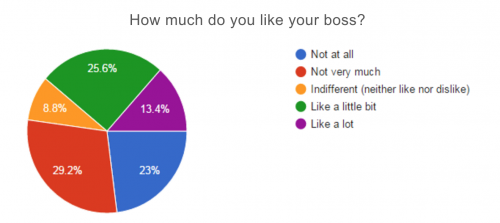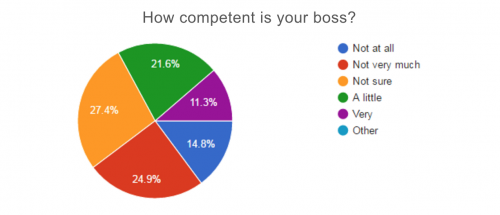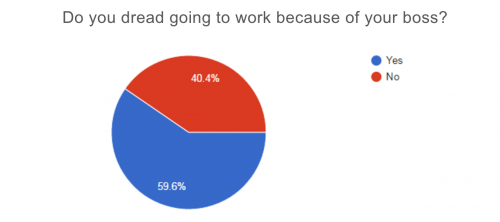Can You Make Good Money Without Managing People?

People managers, or middle managers, are those folks at your work that wander around aimlessly delegating all their work to other people.
They thrive in this bureaucratic setup, because they play the game better than anyone else.
They suck up to their bosses and present other people’s achievements as their own. This is what office politics are all about, right?
Not all managers are like that, of course. I’ve worked with some amazing leaders (note, I use a word “leader” not a “manager”, because I genuinely think that smart people cannot be managed).
60% of UK Millennials DREAD their bosses
Free Office Finder asked over 1,000 office workers in the UK how they view their managers.
Out of the 1052 surveyed, over half either don’t like their boss at all or don’t like them very much.

52.2% don’t like their boss
The frustrating bit? 94% of all respondents are Millennials, 18-35 young ambitious yet discouraged adults in their prime.
And it goes beyond likability: 40% of respondents think that their managers are incompetent at their jobs, with only 11% who think they are very good.

40% think that their managers are bad at their jobs
And because of incompetent and unlikable managers, 62% of UK Millennials have quit their jobs because of managers, not the job itself.
Interestingly, female managers are more liked than men. Almost half of all participants liked their female boss, but only 39% of respondents had positive feelings towards their male boss.
Also, it appears that 19% of all survey respondents like their female boss a lot compared to only 9% for males.
Do we actually need people managers?
What to do with people managers in an agile company full of super-smart people, who don’t care about authority figures telling them what to do?
Do we really need them at all?
Yes, stuff still needs delegating.
But the role of a “people manager” is not what you think it is.
People managers talk to people. A lot.
Their job is to protect creative and shy designers from demanding and unreasonable business people, help sales people understand the difficulties and processes tech people go through, explain to business owners the difference between the cost and investment, and many more tedious “people things”, that creative people or doers simply have no interest in.
We still need people managers, who understand human psychology and sensitivities of communication. These managers need to be able to bring all the pieces together whilst letting the rest of the team work on what they do best.
Think of people manager as producers or project managers, who are responsible for optimising the process and delivering value rather than telling people what to do.
I do, however, strongly think that no individual should have a say on another person’s pay, job title or promotion! Companies should have a transparent system that links individual results with a pay-check.
Middle management should not have authority over people! This creates toxic office politics that good workers have no time or energy for.
Can you make good money without managing people?
For too long, your career advancement meant first becoming a manager of a small team, then a bigger team, and eventually an entire department.
Your title, pay, and recognition were tied to people management.
But does this old approach to career development makes sense today?
What about those, who are brilliant at their jobs and want to earn a lot of money, but have no interest in managing people?
Silicon Valley has long recognised this issue. The top 4 tech giants— Google, Facebook, Amazon, and Apple —are known for offering technical or specialist tracks for talented engineers who don’t aspire to manage anyone but themselves.
They call it a guru track.
Gurus may be awarded the reins of progressively larger projects with bigger budgets. Their promotions are based not on team performance but on individual impact within an organisation.
And, most importantly, gurus are rewarded the same way as individuals on the management track—with new job titles, opportunities for training and professional development, enhanced pay and incentive packages and other perks.
The result is a potential win-win for employees and employers. Exceptional employees get to continue doing what they do best while also being given a clear path for advancement.
The organisation, in turn, retains the top talent.
“Since talent attracts talent, a virtuous recruitment cycle is set in motion: High-calibre candidates will line up to work alongside the right gurus. Plus, as thought leaders writing and speaking about their areas of expertise, gurus function as key brand ambassadors, drawing positive attention to the company and its corporate culture.” – Ryan Holmes, the founder and CEO of Hootsuite.
***
Over to you.
Do you think an individual career advancement is feasible or will we always need someone below us?




